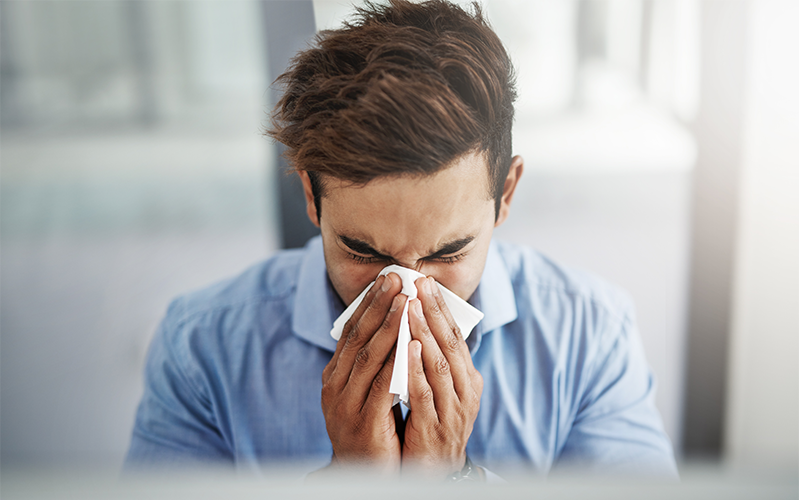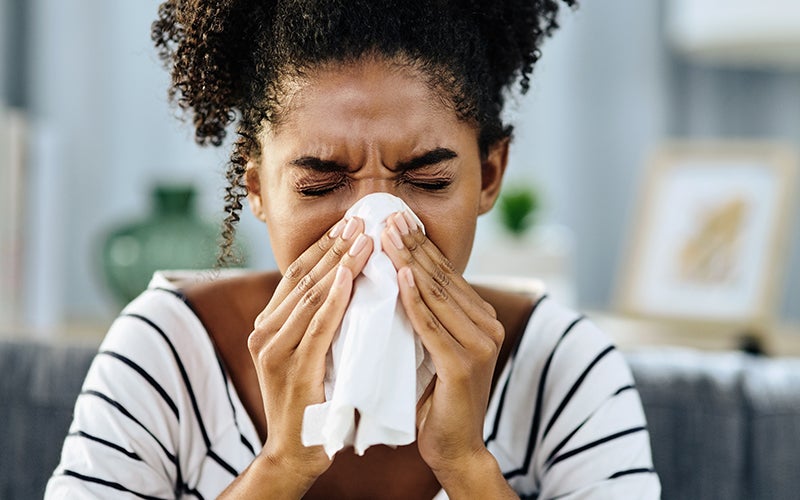Is It Good or Not to Exercise with a Cold?
 © foodspring
© foodspring
Will breaking a sweat get rid of your germs or make your cold worse? Here’s what you need to know.
The common cold explained
The cold weather is officially here, which means that winter illnesses, like the common cold, or rhinopharyngitis, which is an infection of the upper respiratory tract, are on the rise. In case you aren’t sure, these are the symptoms of a cold:
- Stuffy and runny nose
- Hoarse voice and sore throat
- Muscle and joint pain
- Coughing
- Headaches
- Worst case: a fever.
Common colds are viral infections, which is when viruses attack your body, your body fights back, and you’re weak, sick, and tired as a result.
Tip: It’s especially important during the colder months to support your immune system with vitamins and nutrients. If you’re not able to eat the daily recommended five fruits and vegetables, our Daily Vitamins will help you get all the vitamin D, C, and B12 you need anyway. Try our Daily Vitamins
Colds and exercise: what happens to your body after
Working out regularly will bolster your immune system when you’re healthy, but it’s another story entirely when you’re sick. To recover properly, your immune system requires as much energy as it can get.

If you workout while you’re sick, you’ll burn energy that your body could be using to help you feel better. Not to mention, it’s usually too much for your immune system to even handle, often resulting in a cold that gets worse and lasts longer.
Exercise stimulates the viruses and encourages them to migrate, and if they migrate to an organ like the heart, you run the risk of developing heart inflammation, which, in the worst case scenario, can be life-threatening.
Tip: Your health should always come first. If you’re starting to feel sick, give your body the rest it needs. Drink enough water, get enough sleep, and eat a balanced diet. This is the best possible way to ensure a speedy recovery.
Healing by sweating from exercise
Despite what you may have heard before, sweating won’t destroy a virus. In fact, intensive training and sweating actually tend to spread the infection and cause your cold to get worse.

Exercising with a cold: the neck rule
Should you stop working out the second you realize your nose is stuffy? There’s no easy answer to this question, because every cold is different. A little physical activity can stimulate healing if you have a mild cold. And exercising at a moderate intensity can improve blood circulation in the nasal canals. But again, if you work out too hard, it can make your cold worse rather than better.
If you’re not sure if you should be working out, use the “neck rule” which dictates that you can go to the gym if your symptoms are all located above the neck, like a stuffy nose. If the symptoms are below the neck, such as swollen tonsils, tense muscles, and fever, then exercising is out of the question.
Don’t mess around with your health. By giving your body the time it needs to rest, you’re putting all the chances on your side for a quick and painless recovery. Take a few days off and you’ll already notice a huge effect on how you feel, and you won’t lose muscle or gain weight in the meantime.

How long should I take a break from working out? When can I start again?
If you’re starting to feel better, you might already be planning your next trip to the gym. Not so fast! Even if you’re feeling better, your body might not be finished kicking the virus out just yet. And if you resume training too early and too intensely, your cold might come right back.
In general, the longer your cold lasts, the longer your workout break should, too. If you have had a fever, then you should wait at least a week after the fever has subsided before resuming exercise. If you didn’t have a fever, then you can resume exercise two days after your symptoms have disappeared.

Even if you feel totally fine, ease yourself back into your workout routine, because your body will still be weak from fighting viruses. When in doubt, check in with your doctor first.
Conclusion
- Avoid working out if you experience a fever or symptoms below the neck.
- If your cold is mild, you can continue exercising at a low intensity.
- Intensive training and sweating weaken your body further and slow healing.
- Wait until all symptoms are gone before exercising again.
- Beware of overworking your body: after a cold, exercise at a low intensity.
Sources for this article
We at foodspring use only high-quality sources, including peer-reviewed studies, to support the facts within our articles. Read our editorial policy to learn more about how we fact-check and keep our content accurate, reliable, and trustworthy.

































